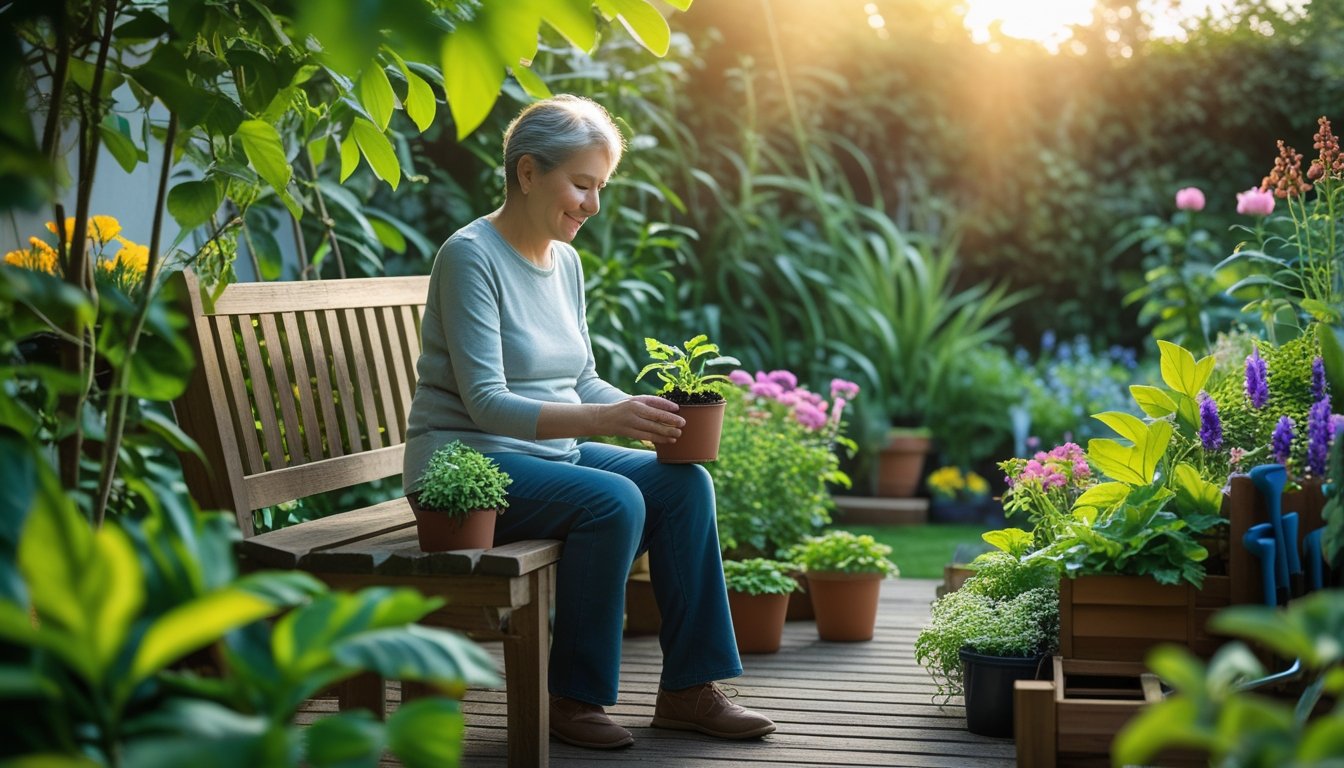Late updated: 27 Jul 2025 08:07
Written by: Ella Thompson
The Impact Of Gardening On Mental Wellbeing Recovery: Enhancing Emotional Health
Gardening is more than just a pleasant pastime; it can be a powerful tool for mental well-being recovery. Engaging in gardening activities has been shown to significantly enhance mental health by reducing stress, anxiety, and depression. Exploring the soothing rhythm of planting, nurturing, and growing our own little patches of earth gives us a sense of purpose and accomplishment. This connection to nature allows us to experience moments of mindfulness and peace.

Countless studies have demonstrated the profound effects gardening can have on mental health recovery. Both community gardens and individual efforts offer therapeutic benefits. By participating in these activities, individuals find an outlet for their emotions, promoting resilience and improving their quality of life. This transformative practice encourages social interaction, boosts confidence, and fosters a heightened sense of well-being.
As we partake in this natural therapy, the healing potential of gardening becomes evident. Observing the fruits of our labour grow reminds us of the strength and resilience we possess. The simple act of tending to plants connects us not only with nature but also with ourselves, contributing significantly to our journey towards improved mental well-being.
Key Takeaways
- Gardening enhances mental health by reducing stress and anxiety.
- Community gardening fosters social interaction and resilience.
- Gardening connects us to nature and contributes to well-being.
How Gardening Supports Mental Wellbeing Recovery
Gardening has various impacts on mental well-being, primarily through stress reduction, mood enhancement, and a sense of connection to nature. These components can play a vital role in mental health recovery, integrating purposeful activity with psychological benefits.
Mechanisms Linking Gardening and Mental Health Improvement
Engaging in gardening activities can lead to significant improvements in mental health by providing stress relief and mood elevation. Immersion in nature creates a calming environment and encourages mindfulness, which reduces stress and anxiety levels. Physical activity, even in the form of light gardening, promotes the release of endorphins—natural chemicals in the body that enhance mood. Additionally, working with plants provides a sense of accomplishment and purpose, vital for improving mental well-being. Sensory stimulation through sights, smells, and tactile experiences further contributes to the mental health benefits of gardening.
Evidence for Gardening Interventions in Mental Health Recovery
Studies and research demonstrate the effectiveness of gardening interventions in supporting mental health recovery. A meta-analysis of various studies indicates significant improvements in mental health outcomes through structured gardening programmes. For instance, the University of Essex conducted research proving that green environments have a measurable impact on mood and self-esteem. The NHS in the UK has adopted gardening as part of social prescribing, where individuals are referred to participate in community gardening to alleviate stress and improve mental health. These findings show that structured gardening interventions can serve as valuable psychosocial treatments in mental health services, especially post-COVID-19, where natural and community-based recovery methods are increasingly utilised.
Therapeutic Gardening and Horticultural Therapy
Therapeutic gardening and horticultural therapy (HT) form established approaches within mental health fields. These therapies utilise tailored activities involving plant cultivation and garden maintenance to aid mental well-being recovery. Structured sessions focus on personal goals, encouraging skills development and emotional expression through nature-based tasks. Horticultural therapy's application extends to vulnerable groups, improving the quality of life for those with mental health conditions. The personalised nature of these sessions means that therapies are adaptable to individual needs, marked by their accessibility and inclusivity—a testament to their increasing role in mental health treatment and services globally.
Key Benefits and Broader Impacts of Gardening for Mental Health

Gardening provides numerous mental health benefits, supporting emotional and psychological resilience while fostering social connections. It also promotes physical health, contributing to an improved lifestyle. Let us explore these aspects further.
Emotional and Psychological Benefits
Gardening offers profound emotional and psychological advantages. Engaging in this activity can significantly enhance emotional well-being by reducing symptoms of depression and anxiety. The presence of green spaces provides a serene environment conducive to emotional regulation and relaxation.
Lowers of cortisol levels help counteract stress, leading to improved emotional resilience and decreased mental ill-health. Additionally, gardening boosts self-esteem and offers a sense of achievement and personal growth. The opportunity to connect with nature enhances our overall quality of life and life satisfaction.
Social Connection and Community Gardening
Community gardening plays a pivotal role in enhancing social connections and combating social isolation. It offers opportunities for social interaction, reducing loneliness. Participants often develop strong bonds through shared activities, fostering a sense of belonging and social support.
Community gardens serve as therapeutic spaces where people with mental illness can experience healing. Engaging with others cultivates empathy and promotes a supportive network. Through group involvement, individuals can enhance social skills and gain a better sense of community.
Physical Health and Lifestyle Improvements
Apart from mental health benefits, gardening also contributes significantly to physical health. The physical activity involved in gardening helps improve fitness levels and boosts vitality, aiding in maintaining a healthier weight. Regular gardening tasks can enhance muscle strength, flexibility, and overall wellbeing.
Access to home-grown fruits and vegetables encourages healthier eating habits, positively impacting diet quality. Moreover, time spent outdoors amidst green spaces boosts vitamin D levels, essential for bone health. With these factors combined, gardening serves as a holistic approach to enhancing both mental and physical health.
Frequently Asked Questions

Gardening has notable effects on mental health recovery. It offers several psychological benefits, supports therapeutic practices, and can even influence medication needs. Participation can aid stress coping strategies and foster social interactions in community settings.
What are the psychological benefits of regular gardening for individuals recovering from mental health issues?
Regular gardening promotes a sense of accomplishment and boosts self-esteem. It can help alleviate symptoms of depression and anxiety, providing a calm and controlled environment to focus the mind. This activity offers a tangible connection to nature, which is comforting and calming.
How does horticultural therapy contribute to mental wellbeing recovery?
Horticultural therapy involves structured gardening activities tailored to individual needs. It aids in skill development and emotional expression. Participants often experience improved mood and cognitive function. This therapy can enhance focus and offer a constructive outlet for emotions, significantly augmenting mental wellbeing recovery.
Can gardening activities reduce the need for medication in mental health treatment plans?
Gardening may complement traditional therapies and potentially reduce reliance on medication for some individuals. The stress reduction and mood enhancement benefits can lead to improved mental states, sometimes allowing for adjusted medication dosages. However, any medication changes should always be supervised by healthcare professionals.
What evidence is there to support the role of gardening in improving mood and emotional state?
Numerous studies document gardening's role in reducing stress and enhancing mood. The physical activity involved releases endorphins, the brain's natural mood lifters. The act of nurturing plants can provide a sense of purpose and joy, contributing to an overall positive emotional state.
To what extent does participating in gardening help with coping strategies for stress and anxiety?
Gardening offers hands-on activities that distract from stressors and anxiety triggers. Immersion in this practice encourages mindfulness, with attention absorbed by the tasks at hand. The routine nature of gardening can instil a sense of stability and help build resilience against stress.
What impact does community gardening have on social aspects of mental health recovery?
Community gardening promotes social interaction and fosters a sense of belonging. Sharing gardening tasks enhances teamwork and communication skills, which are vital for mental health recovery. These projects can mitigate feelings of isolation, helping individuals build supportive networks and friendships.
